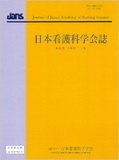Japanese
English
- 販売していません
- Abstract 文献概要
- 参考文献 Reference
要旨
目的:集中治療室(以下ICUとする)に緊急入院した患者が回復意欲を実感していくプロセスを明らかにする.
方法:ICUに緊急入院した成人患者9名に,回復意欲を実感した体験を中心に半構造化面接を行い,修正版グラウンデッド・セオリー・アプローチを用いて質的に分析した.
結果:ICUに緊急入院した患者は,どうすることもできない現実に直面する中で【自律した自己の喪失】を経験し,回復意欲が低下した状態となる.そこから【回復している確信】などの影響を受け,【自律した自己の回復】,【自律した自己の高まり】へと変化しながら,患者は回復意欲を実感していく.こうした変化は,《自律した自己の再獲得》のプロセスであることが示された.
結論:回復意欲は《自律した自己の再獲得》の中で,自律した存在であることを取り戻しながら高まっていく.回復意欲を実感していくプロセスの促進に,身体的回復の促進などが関連することが示唆された.
Purpose: This study aimed to identify the process of realizing motivation for recovery in emergency patients admitted to intensive care units(ICUs).
Methods: Semi-structured interviews were conducted with nine adult emergency patients admitted to the ICUs, focusing on their experiences of recovery motivation. The interview data was analyzed, adopting the Modified Grounded Theory Approach.
Results: Emergency patients admitted to ICUs who experienced an initial <loss of autonomous self> during their helpless state had a lowered motivation for recovery.
Henceforth, the patients began to realize the motivation for recovery, changing to <recovery of the autonomous self> and <increase in the sense of autonomous self> under the influence of the <certainty of recovery> and other factors. The changes were shown to be a process of «restoring the autonomous self».
Conclusions: The motivation for recovery increases as an individual regains autonomy in «restoring the autonomous self». Therefore, promoting physical recovery is essential for facilitating the process of realizing motivation for recovery.
Copyright © 2022, Japan Academy of Nursing Science. All rights reserved.


